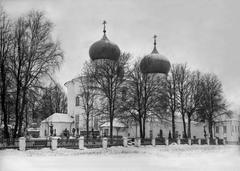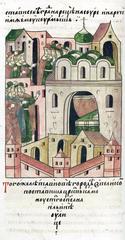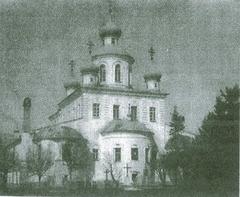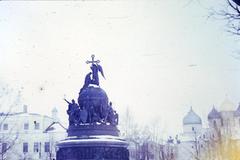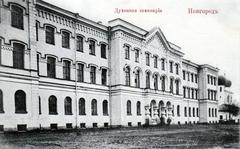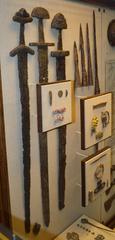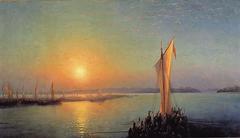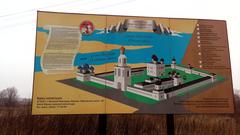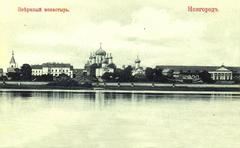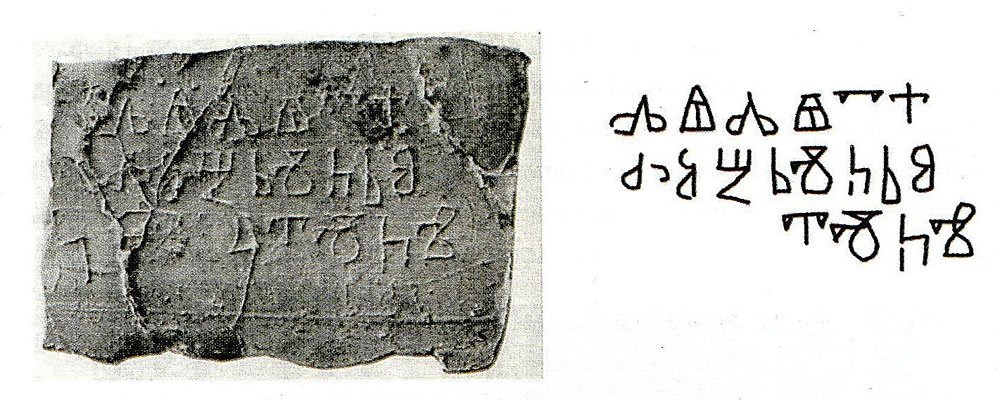
Saint Sophia Cathedral Veliky Novgorod: Visiting Hours, Tickets, and Historical Significance
Date: 14/06/2025
Introduction
Saint Sophia Cathedral in Veliky Novgorod is one of Russia’s most revered monuments, standing as a beacon of medieval architecture, spirituality, and national identity. Completed between 1045 and 1050 under the direction of Bishop Vladimir of Novgorod and Grand Prince Yaroslav the Wise, it is among the oldest stone churches in Russia. The cathedral’s distinctive five-domed silhouette, blending Byzantine and Russian traditions, symbolizes the city’s historical and spiritual prominence during the Kievan Rus’ era (novgorod.travel, rbth.com).
For almost a millennium, Saint Sophia Cathedral has served as the religious, political, and cultural heart of Veliky Novgorod. It has withstood invasions, wars, and political turmoil, remaining a living testament to the resilience and faith of its people. Today, the cathedral is an active place of worship, a UNESCO World Heritage Site, and a must-visit destination for travelers seeking to immerse themselves in Russia’s medieval heritage (guidetopetersburg.com, visitnovgorod.com).
Historical and Architectural Overview
Early Foundations and Construction
Saint Sophia Cathedral was constructed between 1045 and 1050, replacing a wooden predecessor attributed to Bishop Joachim of Korsunian. The transition from wood to stone marked Novgorod’s emergence as a powerful center in Kievan Rus’. The cathedral’s five-domed structure—38 meters high and built from local limestone and brick—set a precedent for northern Russian church design (novgorod.travel, ibnbattutatravel.com).
Architectural Features and Artistic Treasures
The five domes represent Christ and the Four Evangelists, a motif that became standard in Russian ecclesiastical architecture (culturetourist.com). The cathedral’s fortress-like walls and narrow windows reflect both defensive necessity and Romanesque influence. Notable are the Sigtuna (Magdeburg) Doors and the Korsun Gate—exceptional medieval bronze artworks.
Inside, fragments of 11th- and 12th-century frescoes survive, alongside the iconic 12th-century image of the Mother of God of the Sign, believed to have miraculously protected Novgorod in 1170. The cathedral also preserves birch bark inscriptions—rare historical documents offering glimpses into daily medieval life (novgorod.travel).
Religious and Political Role
Saint Sophia Cathedral has always been more than a church; it was the core of Novgorod’s civic life. It hosted the installation of archbishops, treaty signings, and stored invaluable relics. The cathedral’s symbolic status is reflected in sayings like, “As long as there is St Sophia’s, there is Novgorod,” and in local legends crediting it with protecting the city from the Mongols and Ivan the Terrible’s forces (guidetopetersburg.com).
Survival and Restoration
The cathedral survived fires, invasions, and the devastation of World War II, when it suffered significant damage and was later restored. Closed during the Soviet era and used as a museum, it was returned to the Russian Orthodox Church in 1991 and reconsecrated, once again serving as both a place of worship and a historical museum (culturetourist.com).
Visitor Information
Location and Access
Saint Sophia Cathedral is located within the Novgorod Kremlin (Detinets), at Territoriya Kreml’, 11, Veliky Novgorod (UNESCO). Easily accessible from city center hotels and transit points, the Kremlin grounds also house the Millennium of Russia monument, Archbishop’s Palace, and more.
Visiting Hours
- Summer (May–September): 8:00 AM – 8:00 PM
- Winter (October–April): 10:00 AM – 6:00 PM
- Hours may vary during major religious holidays or special events. Always check the official tourism website for current information.
Tickets and Admission
- Admission for worshippers attending services is free.
- Tourists pay a modest entrance fee (typically 150–250 RUB; discounts for students, seniors, and children).
- Tickets can be purchased on-site or online; guided tours are available for an additional fee.
Accessibility
- The main nave is accessible to visitors with limited mobility, though some areas (bell tower, chapels) have stairs and uneven floors.
- Wheelchair ramps and assistance are available at the main entrance; contact the cathedral in advance for support.
Dress Code and Etiquette
- Modest attire is required. Men should remove hats; women should cover their heads. Shoulders and knees must be covered.
- Silence is appreciated, especially during services.
- Photography is allowed without flash or tripods, except during religious ceremonies.
Guided Tours
- Guided tours (in Russian and English) provide historical and artistic context.
- Audio guides and interpretive panels are available.
- Specialized tours focus on icons, architecture, and cathedral legends (tour-planet.com).
Highlights and Nearby Attractions
Cathedral Interior and Artworks
- View original frescoes, icons, and relics of saints.
- Admire the iconostasis and legendary icon of the Mother of God of the Sign.
- Relics of Prince Vladimir Yaroslavich and Bishop Nikita attract pilgrims.
Bell Tower
- Climb for panoramic views of Veliky Novgorod and the Volkhov River (extra fee; not accessible to all).
Novgorod Kremlin and Surroundings
- Explore the Millennium of Russia monument, Archbishop’s Palace, Kremlin walls, and towers.
- Visit nearby Yaroslav’s Court, Yuriev Monastery, Museum of Wooden Architecture, and local cafés.
Seasonal Events and Services
- The cathedral holds regular Orthodox liturgies, feast days, and processions.
- Major holidays such as Easter and Christmas feature elaborate services—arrive early for best access.
- Summer festivals may feature concerts and historical reenactments.
Visitor Amenities
- Restrooms, souvenir shops, and cafés are available within or near the Kremlin.
- Gift shops offer icons, books, linens, and regional delicacies.
- Limited parking is available near the Kremlin.
Safety and Travel Tips
- The cathedral and Kremlin are generally safe, with security present.
- Wear comfortable shoes for cobblestone paths.
- Be vigilant against pickpockets during crowded times.
- Allow at least 1–2 hours for a meaningful visit.
Frequently Asked Questions (FAQ)
Q: What are the Saint Sophia Cathedral visiting hours?
A: Summer: 8:00 AM – 8:00 PM; Winter: 10:00 AM – 6:00 PM. Check the official site for updates.
Q: How much are the tickets?
A: Entrance is 150–250 RUB for tourists, free for worshippers.
Q: Is the cathedral accessible to visitors with disabilities?
A: The nave is accessible; some areas are less so due to stairs. Assistance is available upon request.
Q: Are guided tours offered?
A: Yes, in multiple languages. Book via the tourist center.
Q: Can I take photos inside?
A: Yes, without flash or tripods. Observe posted restrictions.
Q: What else should I see nearby?
A: The Kremlin grounds, Yaroslav’s Court, Yuriev and Antoniev Monasteries, and the Museum of Wooden Architecture.
Conclusion
Saint Sophia Cathedral Veliky Novgorod stands as a unique intersection of spiritual devotion, historical endurance, and architectural innovation. Its five domes, ancient frescoes, and enduring legends make it an essential destination for any visitor to Russia. By respecting its sacred traditions and exploring its treasures through guided tours or audio guides, travelers will gain a profound appreciation for Russia’s medieval heritage.
For more information, the latest visiting hours, and tour bookings, consult the official tourism website and consider the Audiala app for self-guided tours and updates.
Further Reading and Official Sources
- Saint Sophia Cathedral Veliky Novgorod: Visiting Hours, Tickets, and Historical Overview
- Saint Sophia Cathedral Veliky Novgorod: Visiting Hours, Tickets, and Historical Insights
- Architectural Highlights and Visitor Guide to Saint Sophia Cathedral in Veliky Novgorod
- Saint Sophia Cathedral Veliky Novgorod: Visiting Hours, Tickets & Historical Guide
- Searching for Old Russia: A Guide to Visiting Veliky Novgorod and Pskov
- Major Sightseeings of Veliky Novgorod
- Veliky Novgorod Russia Explored: 4 Must-See Landmarks and Archaeological Sites to Add to Your Bucket List
- Top 10 Attractions to Visit in Veliky Novgorod
- Audiala: Guided Audio Tours of Veliky Novgorod

